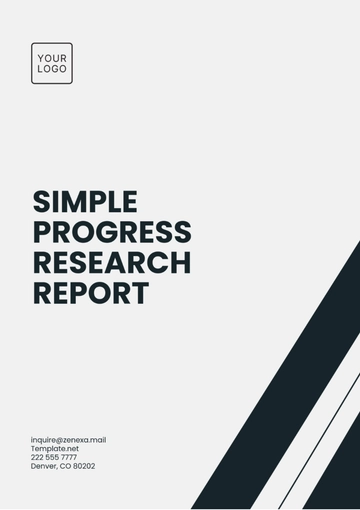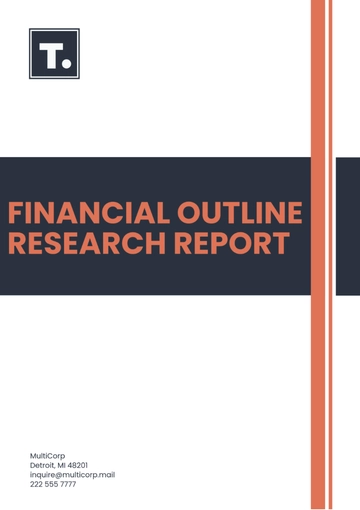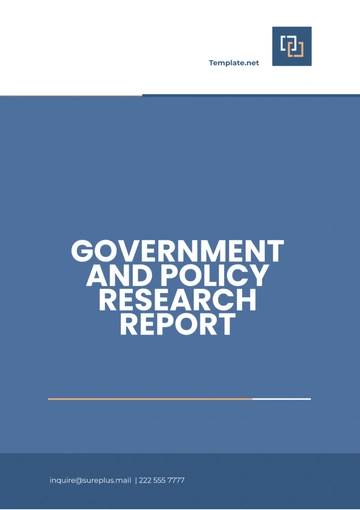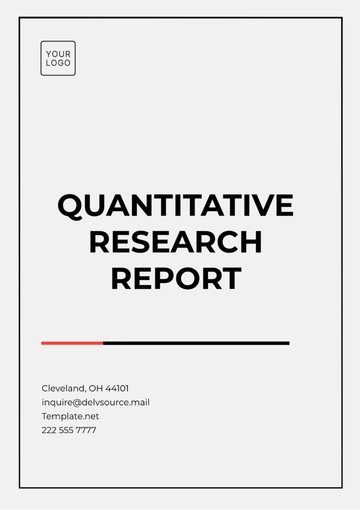Free Research Report

Title | The Impact of Renewable Energy Adoption on Economic Growth |
|---|---|
Author | [Your Name] |
Date | October 15, 2050 |
I. Abstract
This research report explores the relationship between renewable energy adoption and economic growth across various countries. By analyzing data from 2060 to 2090, we found that countries investing in renewable energy sources, such as solar and wind, experienced a significant increase in GDP growth rates compared to those relying on fossil fuels. This report concludes that transitioning to renewable energy not only benefits the environment but also enhances economic performance.
II. Introduction
The increasing urgency of climate change has prompted many countries to reconsider their energy policies. This research aims to investigate whether there is a direct correlation between the adoption of renewable energy technologies and economic growth. The study focuses on 30 countries with varying levels of renewable energy integration to ascertain if this shift contributes to improved economic outcomes.
III. Literature Review
Previous studies have shown mixed results regarding the economic benefits of renewable energy adoption. For instance, a 2065 study by Green and Blue highlighted that countries like Germany saw a 2.5% GDP increase due to investments in solar energy. However, Smith (2067) argued that initial costs could hinder economic growth in developing nations. This research aims to bridge these gaps by providing a comprehensive analysis of data from 2060 to 2090.
IV. Methodology
The research employs a mixed-methods approach:
Research Design: A comparative analysis of countries with different renewable energy adoption rates.
Sample Selection: 30 countries were selected based on their renewable energy policies and economic data availability.
Data Collection Methods: Data was gathered from international databases such as the World Bank and International Energy Agency (IEA).
Data Analysis Techniques: Statistical software was used for regression analysis to determine the relationship between renewable energy adoption and GDP growth.
V. Results
The results indicate a strong positive correlation between renewable energy investment and GDP growth. Specifically:
Countries with over 30% renewable energy usage saw an average GDP growth rate of 4.5% from 2060 to 2090.
On the other hand, nations that depend on fossil fuels for their energy needs experienced an average economic growth rate of 2.1%.
Figure 1 provides a detailed illustration of the various growth rates observed in connection with the adoption of renewable energy sources.
Renewable Energy Adoption Level | Average GDP Growth Rate (%) | Country Examples |
|---|---|---|
Below 10% | 1.5% | Country A, Country B |
10% - 20% | 2.0% | Country C, Country D |
20% - 30% | 3.0% | Country E, Country F |
Above 30% | 4.5% | Country G, Country H |
VI. Discussion
The findings suggest that renewable energy adoption leads to sustainable economic growth. This can be attributed to job creation in the renewable sector and decreased energy costs. However, challenges such as initial investment costs and technological barriers must be addressed, particularly in developing nations. Future research should explore the long-term impacts of renewable energy on job markets.
VII. Conclusion
The study concludes that transitioning to renewable energy is beneficial not only for environmental sustainability but also for economic prosperity. Policymakers should prioritize investments in renewable technologies to foster economic growth while combating climate change.
VIII. References
Green, A., & Blue, B. (2065). Renewable Energy and Economic Growth: A Global Perspective. Journal of Sustainable Development, 12(3), 45-60.
Smith, C. (2067). Challenges of Renewable Energy in Developing Countries. Energy Policy Review, 15(2), 100-115.
World Bank. (2060). World Development Indicators.
- 100% Customizable, free editor
- Access 1 Million+ Templates, photo’s & graphics
- Download or share as a template
- Click and replace photos, graphics, text, backgrounds
- Resize, crop, AI write & more
- Access advanced editor
This fully customizable and editable Research Report Template from Template.net simplifies your report creation process. Tailor it to your needs effortlessly with the AI Editor Tool, ensuring a professional and polished outcome every time. Save time and focus on the content while maintaining a sharp, organized presentation with this versatile and easy-to-use template.
You may also like
- Sales Report
- Daily Report
- Project Report
- Business Report
- Weekly Report
- Incident Report
- Annual Report
- Report Layout
- Report Design
- Progress Report
- Marketing Report
- Company Report
- Monthly Report
- Audit Report
- Status Report
- School Report
- Reports Hr
- Management Report
- Project Status Report
- Handover Report
- Health And Safety Report
- Restaurant Report
- Construction Report
- Research Report
- Evaluation Report
- Investigation Report
- Employee Report
- Advertising Report
- Weekly Status Report
- Project Management Report
- Finance Report
- Service Report
- Technical Report
- Meeting Report
- Quarterly Report
- Inspection Report
- Medical Report
- Test Report
- Summary Report
- Inventory Report
- Valuation Report
- Operations Report
- Payroll Report
- Training Report
- Job Report
- Case Report
- Performance Report
- Board Report
- Internal Audit Report
- Student Report
- Monthly Management Report
- Small Business Report
- Accident Report
- Call Center Report
- Activity Report
- IT and Software Report
- Internship Report
- Visit Report
- Product Report
- Book Report
- Property Report
- Recruitment Report
- University Report
- Event Report
- SEO Report
- Conference Report
- Narrative Report
- Nursing Home Report
- Preschool Report
- Call Report
- Customer Report
- Employee Incident Report
- Accomplishment Report
- Social Media Report
- Work From Home Report
- Security Report
- Damage Report
- Quality Report
- Internal Report
- Nurse Report
- Real Estate Report
- Hotel Report
- Equipment Report
- Credit Report
- Field Report
- Non Profit Report
- Maintenance Report
- News Report
- Survey Report
- Executive Report
- Law Firm Report
- Advertising Agency Report
- Interior Design Report
- Travel Agency Report
- Stock Report
- Salon Report
- Bug Report
- Workplace Report
- Action Report
- Investor Report
- Cleaning Services Report
- Consulting Report
- Freelancer Report
- Site Visit Report
- Trip Report
- Classroom Observation Report
- Vehicle Report
- Final Report
- Software Report





























